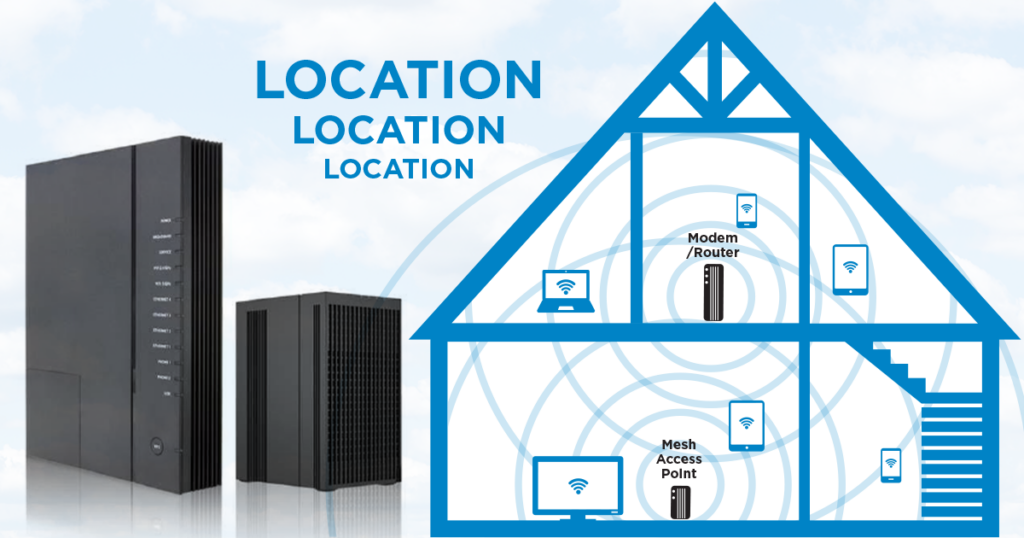Residents can achieve seamless internet coverage across large homes utilizing mesh Wi-Fi systems. Running internet-enabled devices, especially those with streaming capabilities, requires reliable Wi-Fi, but a steady signal can be difficult to maintain far from the home’s router. Users experiencing interruptions or lag might need to upgrade to a mesh system.
These networks feature satellite access points that provide signal across a property, whether occupants are streaming TV shows in the basement, gaming in a bedroom or hosting video meetings in a home office. Whether households are struggling with connection issues or lag, a mesh system can help improve Wi-Fi coverage, indoors and out. (Any resident wanting to extend Wi-Fi coverage to outdoor spaces, like a man cave or she shed, will want to read to the end).
Wi-Fi Systems for Large Areas
Reliability, price and ease of installation are factors residents should consider before upgrading their home’s Wi-Fi equipment. There are two popular options to do so: First is a system utilizing mesh access points, much like those FTC offers customers when the need arises. The second is commonly referred to as access points or extenders and can be purchased and self-installed.
So what are the differences between the two? A mesh Wi-Fi system features several nodes that essentially hand off the signal to whichever devices are nearest, whereas an access point offers a single bridge connecting all devices to the router. Mesh Wi-Fi equipment can be more expensive than an access point, but the system offers a wider coverage range and can be more easily configured to the needs of a home.
How Mesh Wi-Fi Systems Work
In a mesh Wi-Fi system, one node is wired directly to the gateway connection while the others act as satellites, delivering the signal throughout the home. The nodes behave like a web, providing a seamless network. Devices get a signal from the mesh Wi-Fi node that is closest, and when a user moves, the next node provides the signal. If traffic or interference is detected, the best Wi-Fi mesh systems automatically adjust to ensure uninterrupted internet access.
The Benefits of a Mesh Network
Although a mesh Wi-Fi point can be added to an existing router, users will get better performance if the entire wireless network is run with mesh devices. Upgrading to a mesh network might seem like a large undertaking and expense to some residents, but a reliable internet connection is often worth it. The best Wi-Fi and mesh router system provides these benefits:
Uniform Internet Distribution
A mesh network is better than a router when it comes to providing Wi-Fi over a large area or in a home with walls or structures in the way. The coverage a mesh system provides eliminates dead zones and distributes an even signal across the home.
Smart Equipment
Mesh Wi-Fi equipment is smart, meaning the network can configure itself to use the optimal signal path and provide the best possible connection. If a node is offline or receiving a poor signal, mesh Wi-Fi devices automatically reroute traffic to a different node, stabilizing the users’ connections.
Easy To Scale
If a person moves an office to the far corner of the house, the mesh Wi-Fi configuration can be updated to ensure a strong connection in the area. Nodes can be added to the network or moved at any time without a lot of hassle.
App-Run Technology
Mesh technology through FTC is a Premium Wi-Fi offering that includes access to the FTC Internet app. This offers parental controls and guest access plus security features. Residents can customize app notifications to receive alerts about what is important.
Discreet Devices
Those who value the aesthetics of a room appreciate how easy it is to hide mesh Wi-Fi access points without sacrificing signal. The gateway connection can be tucked away and the nodes of a mesh system can be placed in convenient, nondescript locations.
Reduced Interference and Interruption
When Wi-Fi routers in neighboring homes broadcast over the same channel, users can experience interference similar to a traffic jam. Mesh systems automatically detect crowding and interference and switch to a different frequency to keep the signal strength steady.
Using Mesh for Outdoor Wi-Fi for Access
Having a reliable internet connection outside is becoming a necessity for many homeowners. Anyone wanting better coverage in outdoor living or working spaces should consider mesh Wi-Fi. Outdoor mesh access unit, which are directional, can be installed to extend Wi-Fi coverage to those areas. Installing this equipment to the eaves of the home costs $299.95, but after the initial investment, the monthly charge is only $4.95. (Units can be hardwired beyond the edge the home for an additional fee). This addition allows residents to stream TV on the back deck, work in a detached office or play music by the pool without the signal dropping.
FTC offers the best mesh Wi-Fi equipment and among the fastest internet speeds in the marketplace. Need more bandwidth or better coverage? Call 888-218-5050 or stop by one of FTC’s seven stores. You can also get more information on the internet plans by going to ftc.net.




